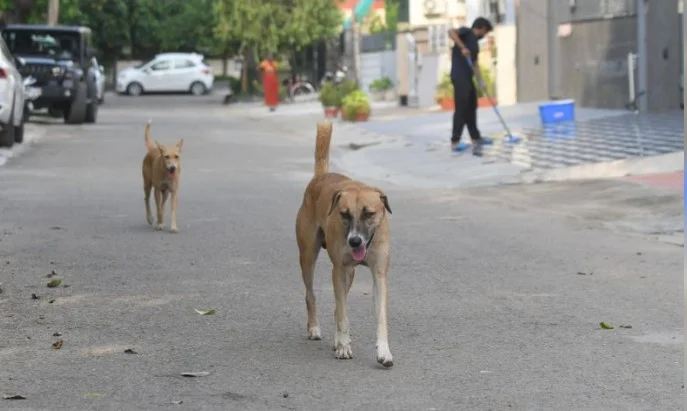Chandigarh, Aug 12 — More than 3,000 cases of stray dog bites have been reported in the city this year, with 300 to 400 residents falling victim each month, according to Municipal Corporation data.
Locals across multiple sectors say fear has gripped neighbourhoods, with children and elderly particularly vulnerable to aggressive dogs. A group of residents shared a complaint highlighting how a single aggressive dog attacks two to three school-going children aged 5 to 12 every morning.
“The dog doesn’t spare anyone — passersby, beggars, vegetable vendors, or milk delivery men. Even adults are being bitten regularly,” one resident said. Despite repeated complaints to authorities, no effective action has been taken, forcing many victims to seek costly anti-rabies treatment at their own expense.
Residents plan to submit a signed petition urging authorities to capture and vaccinate aggressive dogs. “If sterilisation isn’t possible right away, vaccination is critical to prevent rabies,” they added.
The crisis worsened after the Municipal Corporation halted sterilisation efforts in February due to a lapse in the contractor’s agreement, resuming only in late July after a six-month gap.
Congress MLA Chander Mohan criticised the BJP-led Municipal Corporation for its “shocking indifference” and inaction. “In what civilised city are over 3,000 dog bites tolerated in eight months while the administration remains silent?” he asked, slamming the sterilisation delay as clear negligence.
He dismissed the corporation’s promises of compensation and medical aid as “hollow” and questioned why pet dog registration, leash laws, and feeding rules remain unenforced.
Mayor confirmed the sterilisation process restarted in July, stating, “It’s been a month of continuous efforts to control the rising population of dogs.”
Beyond bites, residents face challenges in accessing proper medical care. Anti-rabies injections at General Hospital, Sector 6, cost Rs 100, but the hospital does not stock Human Rabies Immune Globulin (HRIG), essential for treating deep wounds. Victims must visit the Sector-19 dispensary or private hospitals where HRIG can cost up to Rs 15,000.
In March, the civic body proposed setting up medical relief at five community centres and discussed Rs 10,000 compensation for bite victims, but these measures have yet to be implemented.
“This is not just a civic issue — it’s a public health emergency,” Mohan said, demanding accountability and calling for a special House session to address the crisis.
Civic groups, including the Federation of Residents Associations (FORA), also blamed the Municipal Corporation for the surge. FORA president RP Malhotra and general secretary Bharat Hiteshi pointed to the sterilisation gap and poor regulation of stray animal feeding as key factors.
Hiteshi criticised the MC for failing to enforce resolutions on pet dog registration, controlling open defecation, and ensuring pets are leashed in public. Although the Mayor recently announced plans to enforce pet registration with ID tokens, residents and FORA say this remains on paper.
Malhotra urged the Commissioner to prioritise sterilisation, vaccination, and public safety measures. Residents now also demand designated feeding areas and strict enforcement of pet ownership rules.

